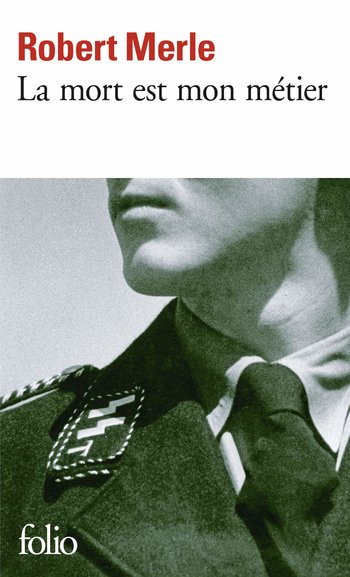
Death is my Trade (La mort est mon métier in French) is a fictionalized biographical novel by French author Robert Merle, published in 1952. It is based on the memoirs of the commandant of the Auschwitz death camp during World War II, Rudolf Höß.
Rudolf Lang is a young man living in Germany, with a very strict that wants him to become a priest to expy his own "sins". However during an accident involving a friend, Rudolf thinks that his priest betrayed his confession (which he didn't) and thus loses faith. Following that, he finds a new purpose in the army, enlisting during World War I. Once the war ends, being no longer needed, Rudolf falls into a spring of depression, until he joins the newly founded Nazi party, giving him a sense of purpose at last.
Death Is My Trade provides examples of the following tropes:
- Driven to Suicide: Rudolf having been driven mad by the schedules of his work, plans on shouting himself but is stopped by a co-worker.
- Even Evil Has Standards: Rudolf's subordinate ends up killing himself, because he can't stands the screams of Jews being killed in the gas chambers and the smell of the burning corpses.
- Freudian Excuse: An important point of the book. Rudolf's need for direction and an authority figure is a direct result of his father constent diaspproval.
- From Nobody to Nightmare: From a small kid who just wanted his father to notice him, to one of the pillars in the process of the extermination of Jews.
- Happiness in Slavery: Rudolf only seems to feel like living when he is following orders.
- Historical Hero Upgrade: While the Rudolf of real wasn't any more human than his book counterpart, at least Book!Rudolf is described as being loyal and never thought about doing something that was out of duty, while Real Life!Rudolf was apparently corrupt.
- Insistent Terminology: "Pardon me but I only killed 2,5 millions units on the 3,5 millions I was supposed to".
- Nazi Protagonist: Rudolf from the point where he joins the Nazi party.
- Very Loosely Based on a True Story: Zig-Zagged. Merle voluntarily made Lang into a tragic figure but also based the events of the book on Höß's testimony and records of Nurembergs trials.
- Villainous Breakdown: Rudolf has one when he learns that Himmler killed himself and left him faces alone the responsibility of his actions.
- Villain Protagonist: Rudolf is our "hero", a nazi and also a mass murderer.
- "Well Done, Son" Guy: Rudolf's reason to live is to satisfy his superiors and fill his duty to replace the approval his father never gave him.
